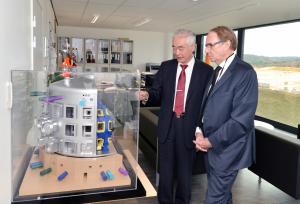Aix-Marseille University signs agreement with ITER
27 Feb 2014
-
R.A.
"Aix-Marseille University and the ITER Organization have two essential traits in common. Both are young and turned towards the future," said Aix-Marseille University president Yvon Berland.
It took three generations of physicists to bring fusion research to the point of building ITER. It will take another to bring fusion-produced electricity to the grid and many more to build and operate the fusion plants of the future.
Training the physicists, engineers, lawyers and administrators who will carry out this immense task is one of the major preoccupations of the fusion community.
With this objective in mind, the ITER Organization and Aix-Marseille University signed a Memorandum of Understanding on Wednesday 26 January aimed at promoting cooperation and exchanges between both institutions.
"Aix-Marseille University and the ITER Organization have two essential traits in common. Both are young and turned towards the future," said University president Yvon Berland as both parties were preparing to sign the agreement in the ITER Council Chamber.
Although the academic history of Provence goes back to the 15th century, it is only in 2012 that the region's three public universities were federated into a new entity, the Université d'Aix-Marseille.
With an enrollment of 72,000 students in arts and languages, law and political science, economy and management, science and technology, and health, Aix-Marseille University is presently the largest French-speaking university in the world.
"After more than eight years of presence in Provence, ITER now belongs to this region," said ITER Director-General Osamu Motojima at the signature ceremony. "The partnership that we are engaging in today is of special significance to us."
Building on a collaboration that began in 2007 with the organization of the ITER International Summer School, the agreement signed on Wednesday with provide a legal framework for the exchange of young scientists and engineers and the implementation of joint research projects in a number of areas such as fusion science, law and social and human sciences.
"In reality," added DG Motojima, "we will do much more than that. By collaborating to make fusion energy a feature of everyday life, we will strongly contribute to a more peaceful world. I know of very few tasks that could be more meaningful, more rewarding and more worthy of our dedication."


